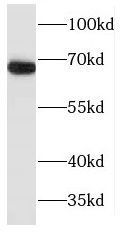Products
MAPKAP1 antibody
Category:
Research Area:
- SPECIFICATIONS
- Product Name
- MAPKAP1 antibody
- Catalogue No.
- FNab04997
- Size
- 100μg
- Form
- liquid
- Purification
- Immunogen affinity purified
- Purity
- ≥95% as determined by SDS-PAGE
- Clonality
- polyclonal
- Isotype
- IgG
- Storage
- PBS with 0.02% sodium azide and 50% glycerol pH 7.3, -20℃ for 12 months(Avoid repeated freeze / thaw cycles.)
Immunogen
- Immunogen
- mitogen-activated protein kinase associated protein 1
- Alternative Names
- MIP1 antibody, SIN1 antibody
- UniProt ID
- Q9BPZ7
- Observed MW
- 65 kDa
Application
- Tested Applications
- ELISA, WB, IHC
- Recommended dilution
- WB: 1:500-1:2000; IHC: 1:20-1:200
Validated Images
 mouse kidney tissue were subjected to SDS PAGE followed by western blot with FNab04997(MAPKAP1 antibody) at dilution of 1:500
mouse kidney tissue were subjected to SDS PAGE followed by western blot with FNab04997(MAPKAP1 antibody) at dilution of 1:500
 Immunohistochemistry of paraffin-embedded human kidney using FNab04997(MAPKAP1 antibody) at dilution of 1:100
Immunohistochemistry of paraffin-embedded human kidney using FNab04997(MAPKAP1 antibody) at dilution of 1:100
- Background
- Subunit of mTORC2, which regulates cell growth and survival in response to hormonal signals. mTORC2 is activated by growth factors, but, in contrast to mTORC1, seems to be nutrient-insensitive. mTORC2 seems to function upstream of Rho GTPases to regulate the actin cytoskeleton, probably by activating one or more Rho-type guanine nucleotide exchange factors. mTORC2 promotes the serum-induced formation of stress-fibers or F-actin. mTORC2 plays a critical role in AKT1 'Ser-473' phosphorylation, which may facilitate the phosphorylation of the activation loop of AKT1 on 'Thr-308' by PDK1 which is a prerequisite for full activation. mTORC2 regulates the phosphorylation of SGK1 at 'Ser-422'. mTORC2 also modulates the phosphorylation of PRKCA on 'Ser-657'. Within mTORC2, MAPKAP1 is required for complex formation and mTORC2 kinase activity. MAPKAP1 inhibits MAP3K2 by preventing its dimerization and autophosphorylation. Inhibits HRAS and KRAS signaling. Enhances osmotic stress-induced phosphorylation of ATF2 and ATF2-mediated transcription. Involved in ciliogenesis, regulates cilia length through its interaction with CCDC28B independently of mTORC2 complex.



